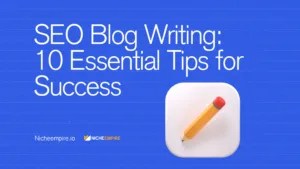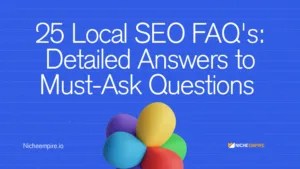 Best Practices for Writing Effective SEO Meta Titles
Best Practices for Writing Effective SEO Meta Titles
Imagine you’re in a bustling marketplace. You’ve got the best product, but it’s yet to be discovered. Frustrating, right? That’s what happens to your website if it doesn’t have a strong, SEO-friendly meta title.
Your website’s title is like a storefront sign. It’s the first thing people see and often decides whether they click through to your site. A well-crafted title can attract more visitors, increase your site’s CTR (Click-Through Rate), and improve your website’s ranking in search engine results.
What is a Meta Title?
A meta title is the HTML title element of a web page; they are gateways to your web content. The title appears in search engine results and on browser tabs. They serve as the first impression in search engine result pages (SERPs), enticing users to click on your website, which influences your SEO rankings. Does SEO title meta matter? Yes, because according to Backlinko, even a one-spot increase in rankings will increase your CTR by 2.8%, so optimizing your meta title tags is important.
In this article, you’ll learn the best practices for creating effective meta titles and helping search engines understand your content while improving your page’s SEO clicks from search results.
Does Page Titles Matter?
Yes. a compelling meta title matters because it:
- Improves Search Engine Rankings: Search engines use meta titles to understand your page’s content. A well-optimized title can help your page rank higher in search results.
- Increased Click-Through Rate (CTR): A compelling title can entice users to click on your search results; which is a positive signal for improving your website’s rankings and search traffic.
- Better User Experience: A clear and relevant title helps users quickly understand your page’s content, of course, that optimizes the overall user experience.
How to Craft Effective Meta Titles
1. Keyword Research
To create an optimized title for your webpage, you will need to identify the primary keyword you want to target. Use tools like Google Keyword Planner to find relevant keywords about the topic you want to write about. Keywords are the backbone of SEO, and their placement in meta titles can significantly impact your search engine rankings.
2. Use the keyword
Now that you have found the relevant keywords for your blog post, use this keyword in your meta title by modeling titles ranking for that specific keyword on search results. With a 45% higher CTR for titles with primary or similar keywords, placing your most important keyword at the beginning of the title is a good idea.
For example, if your business has to do with e-commerce, then your meta title should look like this:
Meta Title: “Buy Stylish Winter Jackets Online – Free Shipping!”
This example shows that we used the products you are selling in the title, which significantly increase your page’s CTR.
3. Keep it Concise
A perfect meta title stays within 45-60 characters to avoid truncation on search results. Search engines often truncate titles that are too long, so you should keep that in mind. Place primary keywords at the beginning of the title for better emphasis. The title should clearly describe the content of your page while being enticing to the audience.
Example:
“How to Write Effective Meta Titles for SEO”
This example includes keywords like “meta titles” and “SEO” while maintaining clarity and relevance.
4. Use Strong, Action-Oriented Language
Use words that evoke curiosity, urgency, or excitement. For example:
- “Ultimate Guide,”
- “Quick Tips,”
- or “Limited Time Offer.”
You can also add power words like:
- “best,”
- “free,”
- “numbers,”
- “current year,”
- “bracket,”
- and “secrets.”
When used in titles correctly, these click triggers are adequate and can attract more clicks.
5. Be Specific and Use Brand Names
Clearly state your page’s topic and ensure it aligns with your content and search intent. Avoid generic titles like “Website Title.” Instead, use your keyword; it’s more specific and helpful to users. Another thing you can do to make your title more compelling is to brand your meta SEO title. Include your brand name or a relevant keyword in your title to increase your brand name visibility. Since 75% of users visit the first page of search results, being specific in your titles will help you get more clicks on Google’s first page.
6. Avoid Keyword Stuffing
Use keywords naturally. It can harm your SEO and make your title look spammy and stuffed. After all these, you should test and refine your meta titles. Use tools like Google Analytics to track your meta titles’ performance and discover optimization opportunities. Experiment with different variations to see what works best.
Summary: Writing Effective Meta Title Tags for SEO
The elements mentioned in this article are crucial for SEO and user engagement because they provide context about your content. A well-crafted meta title helps search engines understand your web page and entices users to click, boosting CTR and improving rankings. Remember, a well-crafted title is a powerful tool for driving traffic to your online store.
Putting all that we have learned together, here is a good example. Let’s say you’re writing a blog post about the best ways to fix 404 errors on your site. A good meta title might be:
“How to Fix 404 Errors on Your Site (The Easiest Method)”
This title is concise, informative, and uses the primary keyword we want to rank: “404 (Not found) error.” It’s also likely to attract clicks from people searching for 404 SEO error best practices and tips. If you found this content helpful, we would appreciate it if you shared it with others on social media.
FAQ about SEO Meta Title
What is a meta title, and why is it important
A meta title is the HTML title of a webpage, typically displayed in search engine results and browser tabs. It is an essential part of SEO and can increase your site’s ranking in the search results. A well-crafted meta title can also attract more visitors to your website.
How long should a meta title be?
While there’s no strict character limit, Google generally displays titles of around 45-60 characters. It’s best to keep your titles concise and to the point.
Should I use keywords in my meta title?
Yes, you should include relevant keywords in your meta title. Use keywords naturally and focus on creating a compelling and informative title, not spamming users with keywords just to rank your content.
How often should I update my meta titles?
Review and update your meta titles regularly, especially when you make significant changes to your website content.
Can I use special characters or emojis in my meta titles?
While you can use special characters and emojis in your meta titles, it’s important to use them carefully or better avoid using them entirely. Too many special characters or emojis can make your title look cluttered and unprofessional. It’s best to keep your titles simple and easy to read.



